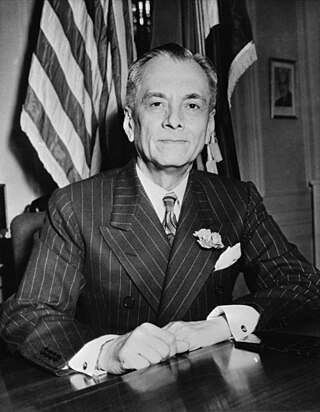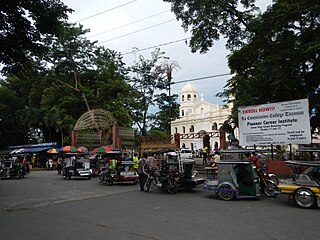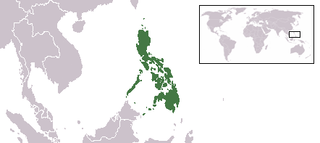
Manuel Luis Quezon y Molina, also known by his initials MLQ, was a Filipino lawyer, statesman, soldier, and politician who was president of the Commonwealth of the Philippines from 1935 until his death in 1944. He was the first Filipino to head a government of the entire Philippines and is considered the second president of the Philippines after Emilio Aguinaldo (1899–1901), whom Quezon defeated in the 1935 presidential election.

The president of the Philippines is the head of state, head of government and chief executive of the Philippines. The president leads the executive branch of the Philippine government and is the commander-in-chief of the Armed Forces of the Philippines.

José Paciano Laurel y García was a Filipino politician, lawyer, and judge, who served as the president of the Japanese-occupied Second Philippine Republic, a puppet state during World War II, from 1943 to 1945. Since the administration of President Diosdado Macapagal (1961–1965), Laurel has been officially recognized by later administrations as a former president of the Philippines.

Rizal Day is a Philippine national holiday commemorating life and works of José Rizal, a national hero of the Philippines. It is celebrated every December 30, the anniversary of Rizal's 1896 execution at Bagumbayan in Manila.

Tanauan, officially the City of Tanauan, is a 1st class component city in the province of Batangas, Philippines. According to the 2020 census, it has a population of 193,936 people.

The Philippine Executive Commission was a puppet government set up to govern the Philippine archipelago during World War II. It was established with sanction from the occupying Imperial Japanese forces as an interim governing body prior to the establishment of the Japanese-backed, Second Philippine Republic.

The National Assembly of the Philippines refers to the legislature of the Commonwealth of the Philippines from 1935 to 1941, and of the Second Philippine Republic during the Japanese occupation. The National Assembly of the Commonwealth was created under the 1935 Constitution, which served as the Philippines' fundamental law to prepare it for its independence from the United States of America.

The Second Philippine Republic, officially known as the Republic of the Philippines and also known as the Japanese-sponsored Philippine Republic, was a Japanese puppet state established on October 14, 1943 during the Japanese occupation of the islands.
The National Assembly was the legislature of the Second Philippine Republic from September 25, 1943, to February 2, 1944.

Benigno Simeon "Igno" Quiambao Aquino Sr. was a Filipino politician who served as Speaker of the National Assembly of the Japanese-sponsored puppet state in the Philippines from 1943 to 1944.

The Kapisanan sa Paglilingkod sa Bagong Pilipinas, or KALIBAPI, was a fascist Filipino political party that served as the sole party of state during the Japanese occupation. It was intended to be a Filipino version of Japan's governing Imperial Rule Assistance Association.

The Makabayang Katipunan ng mga Pilipino, better known as the Makapili, was a militant group formed in the Philippines in December 8, 1944, during World War II to give military aid to the Imperial Japanese Army. The group was meant to be on equal basis with the Japanese Army and its leaders were appointed with ranks that were equal to their Japanese counterparts.

Jose Bayani "Pepito" Hidalgo Laurel Jr., also known as Jose B. Laurel Jr., was a Filipino politician who was elected twice as speaker of the House of Representatives of the Philippines. A stalwart of the Nacionalista Party, he was the party's candidate for the country's vice president in the 1957 elections.

The Apostolic Nunciature in the Philippines is a top-level diplomatic mission assigned by the Holy See to the Philippines, located at 2140 Taft Avenue, Malate, Manila.

Jose Laurel Street is a tree-lined street in the district of San Miguel in north-central Manila, Philippines. It runs parallel to the Pasig River from the Nagtahan Interchange south-westwards to Ayala Bridge. It is where Malacañang Palace and several other government buildings are located.
1943 in the Philippines details events of note that happened in the Philippines in the year 1943.

The Embassy of the Philippines in Tokyo is the diplomatic mission of the Republic of the Philippines to Japan. Opened in 1944 as the first embassy established by a Philippine government, it is currently located in the Roppongi district of Tokyo's Minato ward, near the Roppongi Hills development.

The 1943 Philippine presidential election was held on September 25, 1943, at the midst of World War II.
















